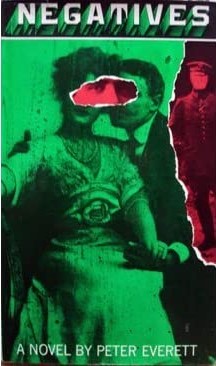 By PETER EVERETT (Fawcett Crest; 1965)
By PETER EVERETT (Fawcett Crest; 1965)
Another novel that falls into the interesting-but-not-entirely-successful category. A highly eccentric quasi-thriller that pivots on the ever-shifting nature of identity, NEGATIVES can be viewed as a more experimental take on many of Patricia Highsmith’s novels, or perhaps a less experimental take on Manuel Puig’s loopy classic BETRAYED BY RITA HAYWORTH. Neither comparison does NEGATIVES any favors!
It begins with Theo, a young Briton, living with his ex-actress wife Vivien in an antique shop they own, where to spice up their sex life the two frequently pretend to be a murderer and his victim. Everything seems well (if somewhat twisted) until the German siren Reingard enters Theo and Vivien’s life. After seducing Theo Reingard impulsively moves into their home, befriending Vivien in the process. Reingard also comes up with a new identity for Theo to playact: the WWI German fighter pilot Manfred von Richtofen.
Naturally things go haywire fairly quickly, with Theo taking to his new faux-identity with a bit too much enthusiasm, burning the costume he wore in his previous guise and purchasing a rotting triplane in which he sits for hours on end. Throughout it all Reingard remains something of an enigma, an incessant troublemaker whose motives are never fully (or even partially) explained. The stage is set for a dark and violent conclusion that, when it finally arrives, is a bit disappointing.
Disappointing sums up NEGATIVES, whose shock value (it was apparently considered quite transgressive back in ’65) has long since worn off. Even more damaging is the fact that despite its intriguing avant-garde edge the novel is overly subdued and detached in its approach. Detachment admittedly seems to be author Peter Everett’s main concern, leading to an excess of minute yet curiously bloodless descriptions intended, one assumes, to present a staid and emotionless reality in which playacting and identity swapping are necessities for survival—or at least that’s how I interpreted it. Beyond that I’m really not sure there’s a whole lot to interpret.
